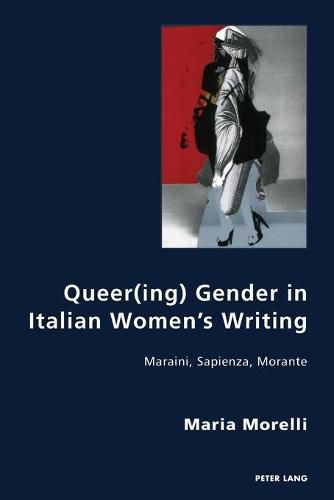Readings Newsletter
Become a Readings Member to make your shopping experience even easier.
Sign in or sign up for free!
You’re not far away from qualifying for FREE standard shipping within Australia
You’ve qualified for FREE standard shipping within Australia
The cart is loading…






This title is printed to order. This book may have been self-published. If so, we cannot guarantee the quality of the content. In the main most books will have gone through the editing process however some may not. We therefore suggest that you be aware of this before ordering this book. If in doubt check either the author or publisher’s details as we are unable to accept any returns unless they are faulty. Please contact us if you have any questions.
QUEER(ING) GENDER IN ITALIAN WOMEN’S WRITING is the first study of its kind to systematically use queer theory as a theoretical framework of analysis of Italian women’s writing. Focusing especially on the writers Dacia Maraini, Goliarda Sapienza and Elsa Morante, and delimiting the field of enquiry to works written in the 1970s and 1980s, the book positions its chosen texts in their historical and cultural backdrop and illustrates the ways in which the authors responded in highly original ways to the debates of the day in matters of gender and sexuality, bringing them close to current queer formulations. Judith Butler is a key interlocutor here, as in the few existing critical contributions offering a queer reading of texts from the Italian literary tradition, but rather than rely predominantly on her theorisation of the performative quality of gender, this book incorporates additional concepts that are key to Butler’s notion of queer, such as parody , citationality , drag and undoing gender . It further seeks to enrich existing critical debates on Italian women’s writing, and on Maraini, Sapienza and Morante in particular, by considering them in relation to other influential queer theorists - including Teresa de Lauretis, Jack Halberstam, Lee Edelman, Sara Ahmed and (the author’s queer reading of) Julia Kristeva - in the belief that the plurality intrinsic to the formulation of queer is crucial for its potential as a tool for critical inquiry.
This book was the Joint Winner of the 2017 Peter Lang Young Scholars Competition in Modern Italian Studies.
$9.00 standard shipping within Australia
FREE standard shipping within Australia for orders over $100.00
Express & International shipping calculated at checkout
This title is printed to order. This book may have been self-published. If so, we cannot guarantee the quality of the content. In the main most books will have gone through the editing process however some may not. We therefore suggest that you be aware of this before ordering this book. If in doubt check either the author or publisher’s details as we are unable to accept any returns unless they are faulty. Please contact us if you have any questions.
QUEER(ING) GENDER IN ITALIAN WOMEN’S WRITING is the first study of its kind to systematically use queer theory as a theoretical framework of analysis of Italian women’s writing. Focusing especially on the writers Dacia Maraini, Goliarda Sapienza and Elsa Morante, and delimiting the field of enquiry to works written in the 1970s and 1980s, the book positions its chosen texts in their historical and cultural backdrop and illustrates the ways in which the authors responded in highly original ways to the debates of the day in matters of gender and sexuality, bringing them close to current queer formulations. Judith Butler is a key interlocutor here, as in the few existing critical contributions offering a queer reading of texts from the Italian literary tradition, but rather than rely predominantly on her theorisation of the performative quality of gender, this book incorporates additional concepts that are key to Butler’s notion of queer, such as parody , citationality , drag and undoing gender . It further seeks to enrich existing critical debates on Italian women’s writing, and on Maraini, Sapienza and Morante in particular, by considering them in relation to other influential queer theorists - including Teresa de Lauretis, Jack Halberstam, Lee Edelman, Sara Ahmed and (the author’s queer reading of) Julia Kristeva - in the belief that the plurality intrinsic to the formulation of queer is crucial for its potential as a tool for critical inquiry.
This book was the Joint Winner of the 2017 Peter Lang Young Scholars Competition in Modern Italian Studies.